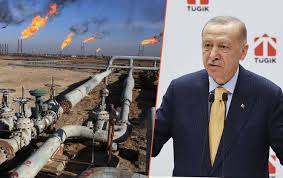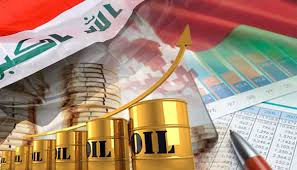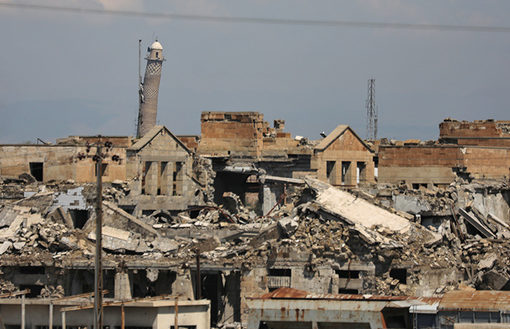Losses resulting from shutdown of conduit to Turkey estimated at more than $4 billion
The once-thriving oil industry in the northern Kurdish region of Iraq has ground to a halt as the closure of the export pipeline to Turkey, now in its sixth month, continues, inflicting economic devastation.
In late March, Turkey halted flows of oil produced in the region after an arbitration court ruled in favour of Baghdad, saying Ankara had breached a 1973 agreement when it allowed Kurds to pump without Baghdad’s consent.
Since then, Baghdad and Ankara have failed to reach a deal to resume oil exports.
The stoppage has had serious consequences in the region, including layoffs and salary cuts, as producers have been forced to cut output, while the regional government has been unable to dispense full salaries and social service payments.
“The situation is very bad,” Ali Youssif, 33, co-founder of Erbil-based Levant Line Company for Logistics and Oil Services, told The National. “All of us are waiting for something to happen to allow the situation getting back to normal.
“All our operations have stopped. I’m not receiving money from the big companies so I can’t continue my work.”
Encouraged by the boom in the oil and gas sector in Kurdistan, Mr Youssif and his partner established their company in late 2020.
They supply chemicals used in the oil production process and their main clients are Norway’s DNO, US’s Hunt Oil and Dana Gas of the UAE.
After suspending their operations, the big energy companies started to lay off their employees – some cutting back as much as 95 per cent of their staff, or paying half salaries for those who stayed in their jobs, he said.
To reduce the expenses, Mr Youssif and his partner laid off three employees in late August. They will close their office and warehouse by the end of this month because they can’t afford the rent. They plan to run their operations from a smaller warehouse.
“We are trying our best to reduce our expenses,” the father of two said. Clients owe them more than $170,000, he added.
“I call them everyday to tell them that we have to pay for the rent and employees, but they say we don’t have money,” he said.
Oil dispute
In 2003 when the US led an international coalition to topple Saddam Hussein’s regime, oil and gas resources in Kurdistan region were not developed. Significant discoveries had been made, but they were left untapped.
After the 2003 invasion, the Kurds gained official autonomy, formalising a situation that had been a de facto reality since 1992, when Iraqi government forces withdrew from the region following their defeat in the 1991 Gulf War.
That autonomy was strengthened and formally recognised by the 2005 constitution.
As both Baghdad and Erbil failed to agree on a federal law to govern the oil and gas sector, the Kurdish authorities signed dozens of oil and gas deals with foreign companies and countries.
Unlike other parts of Iraq, they offered lucrative production-sharing deals, which allowed international oil companies to rapidly recover costs, and split profits between the government and the oil company.
The Kurds argued that Iraq’s constitution gave them the right to sign agreements without consulting Baghdad. But Baghdad maintained that those deals were illegal because it did not approve them. The KRG ultimately passed its own oil and gas law, which Baghdad has never recognised.
In February last year, the Kurdistan oil and gas sector received a major blow when Iraq’s Federal Supreme Court ruled that the region’s law regulating the industry was unconstitutional. The court also demanded that the region hand over all the industry’s activities to Baghdad.
A second blow came in March when the arbitration of the Paris-based International Chamber of Commerce forced Turkey to halt the flow of about 500,000 barrels of oil per day. Of those, about 70,000 barrels came from Baghdad-run fields in the northern province of Kirkuk.
The region generates most of its revenue from oil exports through Turkey. This was supplemented by a share of the federal budget that stands at 12.67 per cent.
That percentage was a massive cut from a prior informal agreement at 17 per cent. The sum was cut following rising anger in Baghdad at the Kurds’ oil exports, failure to hand over production in exchange for budget transfers and a 2017 attempt by the Kurds to annex disputed territory in a failed independence referendum.
Baghdad said the new, lower figure represented a more accurate share given the region’s population.
It also blacklisted the foreign companies who signed deals in Kurdistan and cut the region’s budget when it began independent oil exports in 2014.
The federal government has never been in a stronger position in the years-long row, following the two rulings, and it means there is little prospect of the region regaining significant revenue.
Revenue collapse
Its oil sector has been the lifeblood for its local economy, accounting for 80 per cent of income, according to the Association of the Petroleum Industry of Kurdistan. As of last month, total losses were estimated at about $4 billion since March.
According to Kurdistan Regional Government figures, oil exports generated an average of $733 million a month during the first quarter of 2023.
Last week, Baghdad approved loans for three months starting in September for Kurdistan to pay civil servants as a way to work around this year’s budget, which stipulates that the region is entitled to its share only when it hands over 400,000 barrels of oil per day to Baghdad.
As of last month, output from Kurdistan fields rose by 60,000 bpd month-on-month, to about 204,000 bpd, according to Iraq Oil Report calculations, based on field-by-field data. That production, which is less than half the rate of 431,000 bpd achieved in February, is being sold to the local market, it said.
Unresolved question
While the region’s oil sector is now in federal government hands, it is still unclear how Baghdad will deal with the production-sharing contracts, which it rejects. A clear mechanism to pay the developers is also absent.
However, even if the pipelines re-open, the oil companies are not willing to export oil in the absence of an agreement and they will not accept a flat fee per barrel produced, an arrangement Baghdad has with other developers, Yesar Al Maleki, Gulf analyst at Middle East Economic Survey, told The National.
“This is a major hurdle that is yet to be resolved,” Mr Al Maleki said. Applying a fee per barrel denies “the international oil companies’ full cost reimbursement and a share of profit”, he added.
Given how long the shut-down has been, it may take time and investment for Kurdish oil exports to return to their pre-stoppage levels, and “is unlikely for the fourth quarter”, he said.
Until the oil exports are fully restored, Mr Youssif has a narrow window of time.
“Until now we have survived on our savings, and we have no problem, but if it will continue for sure it will be a huge effect,” he said. He is trying to register the company in Baghdad so that they can compete for deals in other parts of Iraq, he added.
But he still has faith in the Kurdistan region’s oil sector.
“It will stand, but we have the feeling that it will not be like before,” he said.
Source: The National, 21. September 2023








Comment here